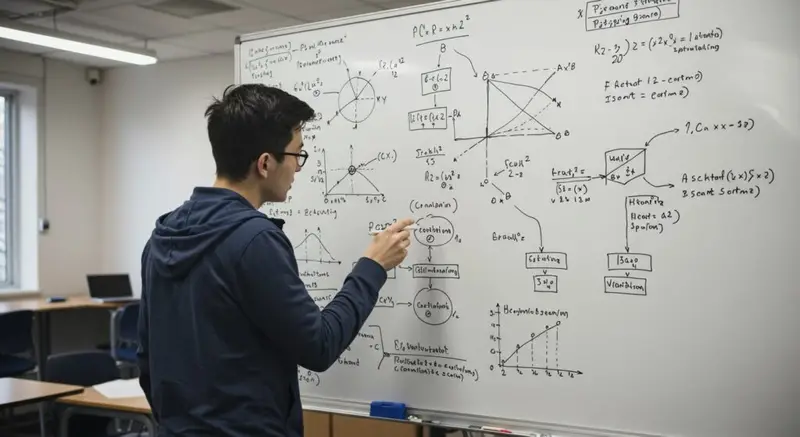Future Research Directions in Optimization for PhD Candidates
The field of optimization is a cornerstone of modern science and engineering, providing the mathematical tools to make the best possible decisions under given constraints. From maximizing profits and minimizing costs to optimizing complex resource allocation and logistical challenges, the demand for advanced optimization research continues to grow. For PhD candidates embarking on their academic journey, identifying impactful and novel research directions is crucial. This article delves into several promising avenues for future optimization studies, offering inspiration for those looking to contribute significantly to this dynamic field.
Table of Contents
- Emerging Trends in Optimization Research
- Specific Application Areas for PhD Topics
- Methodological Innovations
- Essential Skills for Optimization PhDs
- Conclusion
Emerging Trends in Optimization Research
The landscape of optimization is continuously evolving, driven by new computational paradigms and pressing global challenges. PhD candidates have a unique opportunity to shape these emerging trends.
AI-Driven Optimization
The synergy between Artificial Intelligence and optimization is creating powerful new methodologies. Research in this area can focus on developing novel algorithms that combine heuristic search with machine learning to tackle large-scale, non-convex, or dynamic optimization problems. Examples include using reinforcement learning for online optimization or neural networks to approximate complex objective functions.
Optimization for Sustainable Systems
With increasing global awareness of climate change and resource scarcity, optimization plays a vital role in designing and operating sustainable systems. PhD research could explore optimizing renewable energy integration, waste management, circular economy models, or sustainable transportation networks. This often involves multi-objective optimization to balance economic, environmental, and social factors.
Data-Driven Optimization and Machine Learning Integration
The abundance of data presents both opportunities and challenges for optimization. Research can focus on how to effectively integrate large datasets into optimization models, develop robust optimization techniques that account for data uncertainty, or design algorithms that learn optimal policies from historical data. This intersection with machine learning offers fertile ground for innovative contributions.
Specific Application Areas for PhD Topics
Translating theoretical advances into practical impact is a hallmark of successful PhD research. Here are some high-impact application areas:
Healthcare and Biomedical Optimization Research
Optimization can revolutionize healthcare delivery. Potential PhD topics include optimizing hospital resource allocation (e.g., operating room scheduling, nurse rostering), personalized treatment planning, drug discovery processes, or supply chain management for medical supplies. The complexity and societal importance of these problems make them ideal for advanced study.
Logistics and Supply Chain Resilience
Global supply chains are increasingly complex and vulnerable to disruptions. Research can focus on developing optimization models for resilient supply chain design, dynamic routing, disaster relief logistics, or last-mile delivery optimization, especially with emerging technologies like drones and autonomous vehicles.
Energy Systems and Smart Grids
The transition to smart grids and renewable energy sources offers significant optimization challenges. PhD candidates can explore optimizing power generation scheduling, demand-side management, microgrid operation, energy storage systems, or grid modernization projects.
Industrial Systems and Process Control
Manufacturing and industrial processes constantly seek efficiency improvements. Research in this domain could involve optimizing production scheduling, inventory management, quality control processes, or the design of automated industrial systems. This often requires combining continuous and discrete optimization techniques.
Methodological Innovations
Beyond application, there’s always room for fundamental advancements in optimization techniques themselves.
Quantum Optimization
While still in its nascent stages, quantum computing promises to tackle problems currently intractable for classical computers. PhD research could focus on developing quantum algorithms for optimization problems, exploring hybrid quantum-classical approaches, or investigating the theoretical limits and potential speedups of quantum optimization methods. For more details on this frontier, you might explore resources like The Quantum Journal.
Explainable AI in Optimization
As optimization models become more complex, especially when integrated with AI, understanding their decisions becomes critical. Research can focus on developing methods to make optimization models and their solutions more transparent, interpretable, and trustworthy, which is crucial for adoption in sensitive sectors.
Essential Skills for Optimization PhDs
Success in optimization research requires a diverse skill set. The table below highlights key areas of expertise.
| Skill Category | Examples of Specific Skills |
|---|---|
| Mathematical Foundations | Linear Algebra, Calculus, Real Analysis, Discrete Mathematics, Probability & Statistics |
| Optimization Theory | Linear/Nonlinear Programming, Integer Programming, Dynamic Programming, Heuristics & Metaheuristics, Network Flows |
| Programming & Software | Python (with SciPy, PuLP, GurobiPy), C++, R, MATLAB, Julia, Gurobi/CPLEX solvers |
| Problem Modeling | Ability to translate real-world problems into mathematical models, formulating constraints and objective functions |
| Communication | Technical writing, presentation skills, collaboration with interdisciplinary teams |
Developing these skills will not only aid your PhD journey but also open doors to diverse career opportunities.
Conclusion
The future of optimization research is bright, offering a wealth of challenging and impactful directions for PhD candidates. Whether your passion lies in developing cutting-edge algorithms, applying optimization to solve grand societal challenges, or exploring the theoretical frontiers of the field, there are countless opportunities to make a significant contribution. Choosing a topic that aligns with your interests and leverages your strengths will be key to a successful and fulfilling PhD experience. For further guidance on structuring your research, consider reviewing our article on Crafting a Strong Thesis Proposal.


